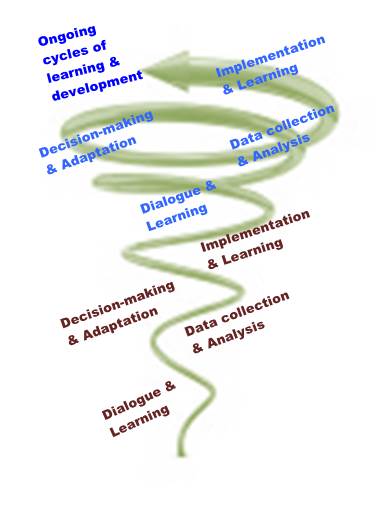The developmental approach highlights overlapping phases of planning, acting and evaluating the program under review. This reflects the intent to:
- support real-time adaptation in the design and implementation of contextually relevant innovations in order to meet the needs of vulnerable populations;
- ensure ongoing knowledge mobilisation among all aspects of the program of research; and
- ensure that capacity development is supported to achieve program objectives.
These phases are, in practice, iterative and interactive components of an evaluative process that support development of the innovations. The intent of a developmental approach to evaluation is to have developed something that can be used by program stakeholders. This can include partnership processes and innovations.

Key characteristics of a developmental approach to evaluation include:
- Embedding an evaluation role within the program rather than having an external evaluator while maintaining independent critical thinking
- Designing the evaluation to support real-time learning and decision-making about what to add, change, discontinue or further develop
- Ensuring that development and evaluation are mutually reinforcing
- Ensuring that data collection, analysis & implementation are ongoing
- Producing context-specific understandings to inform implementation
Applying the developmental approach to evaluation requires focusing concurrently on providing timely feedback and advice based on evaluation findings which can be applied to inform:
- Project development
- Assisting those who are designing and implementing the innovations in meeting their objectives including strategies for capturing progress and outcomes.
- Capacity development
- Helping to build capacities in areas core (i.e., evaluation, implementation, partnership and community development).
- Program development
- Mobilising knowledge generated by research activities to ensure that program components inform one another.
